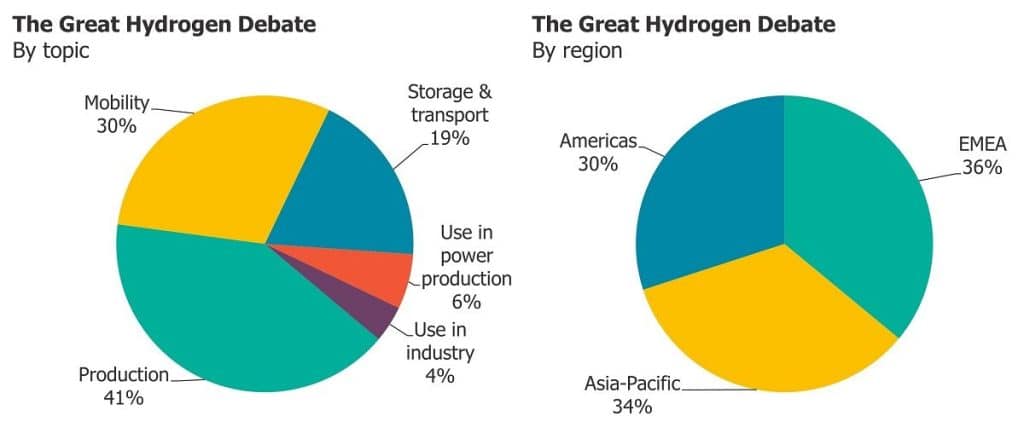The hydrogen economy has become the energy sector’s favorite buzzword. To help untangle what exactly a hydrogen economy will look like, the fundamental enabling technologies (and technology pathways), and, most importantly, the timeline and potential opportunities for industry stakeholders among the hype and hope of hydrogen – we’ve compiled our experts to debate all things hydrogen.
With questions outnumbering answers, we decided to bring the debate to you, presenting our opinions and takes in a series of blogs to better understand what a hydrogen economy would look like, and the effort required to achieve it. Our goal was not to provide definitive answers, but to present key lines of reasoning, highlight tension points, and outline potential scenarios. To stay up to date on these blogs, be sure to subscribe to our newsletter below.
This week we are releasing our first blog in the series – an introductory piece taking a look at the questions you have been asking us about hydrogen. More importantly, finding a way to distill down the key questions related to hydrogen into more bite size pieces. Given that hydrogen has the potential to decarbonize nearly all aspects of the energy system, we analyzed over three years of questions to determine where interest is highest. Using nearly 60 different keywords and search strings, we categorized hydrogen-related questions into the following – production, mobility, storage & transport, use in power production, use in industry.

Production of Hydrogen Tops the List as the Most Asked about Topic in the Hydrogen Economy
Unsurprisingly, hydrogen production is the most asked about topic within the broader hydrogen economy. More specifically, the production of green hydrogen is the key area of focus and one of the primary reasons that it is on our 2021 top emerging technologies to watch list. Looking a bit closer, questions generally fall into two categories – what are the current and emerging technologies for the production of green hydrogen and how does the cost production compare to the conventional steam methane reforming process (grey hydrogen) as well as steam methane reforming with carbon capture (blue hydrogen).
Hydrogen for Mobility Continues to Be an Interest Area Despite the Early Shortcomings of Fuel Cell Vehicles
The mobility sector was supposed to be the foundation of a hydrogen economy, at least that is what automakers such as Toyota believed. However, the rise of battery electric vehicles has largely shifted automaker strategies towards electrification in the past five years. While light-duty vehicles are on a clear path towards electrification, many questions are now focused on the heavy-duty vehicle sector, especially in determining the competitiveness of battery-powered and fuel cell powertrains. While Nikola Motors is likely a blemish to the industry, we continue to witness growing interest for hydrogen development in this sector.
The Hydrogen Economy Is Garnering Global Interest Across a Wide Number of Industries
To our surprise the geographical distribution of organizations asking about hydrogen was nearly equally distributed. This is vastly different compared to other energy technologies we cover that often times are skewed towards one particular region, such as battery recycling (EMEA), CO2 utilization (APAC), and methane detection (Americas). In addition, while organizations in the energy industry were the largest group showing interest in hydrogen, the diversity, including chemicals and materials, aerospace and defense, and even consumer packaged goods, highlights the far-reaching applications of hydrogen.
To tackle the massive undertaking of understanding what would be eventually be a drastic reconfiguring of our energy economy, we broke down our debate into three main questions. Within each of these questions, and with the goal of keeping our debates focused, we debated clear hypotheses chose to reflect what we felt were the key points of contention most important to you.
Will Hydrogen Become the Bulk Energy Carrier of the Future?
- Hydrocarbon production, processing, and refining will continue to be the primary consumer of hydrogen.
- Trucking and long-haul transportation will see an uptick of hydrogen adoption.
- High-temperature process heat or heating in atypical contexts will shift towards hydrogen.
How will hydrogen be transported in a new global energy trade?
- The hydrogen economy is really an ammonia economy.
- Liquid organic hydrogen carriers will be dominant hydrogen transport method.
- Hydrogen is bound to be limited to local production and consumption.
What industry will be the driver for a widespread hydrogen economy?
- Transportation fuel will be the main driver and leading application for hydrogen.
- Hydrocarbon production, processing, and refining will catalyze green hydrogen production.
- Hydrogen will become a bulk energy carrier and the drop-in replacement for natural gas in our energy system.
With three key questions identified and a collection of clear hypotheses chosen, the debate is on. We dive into the first question “Will hydrogen become the bulk energy carrier of the future?” and will be publishing a summary of each of these debates over the next few weeks. Please make sure to subscribe to our energy newsletter for our latest insights.







